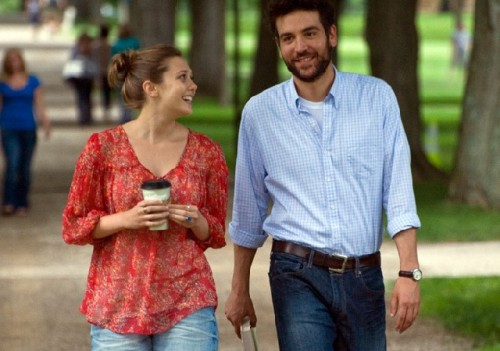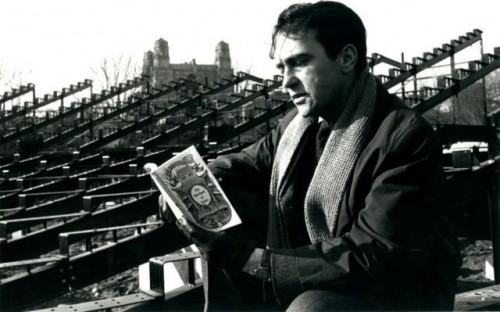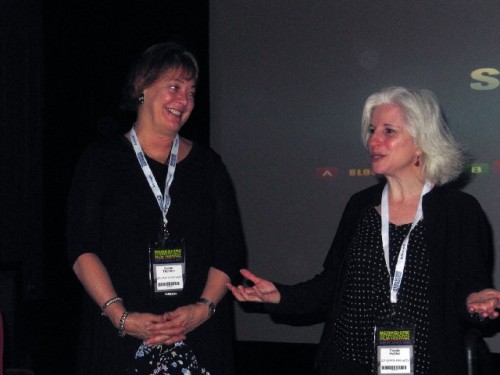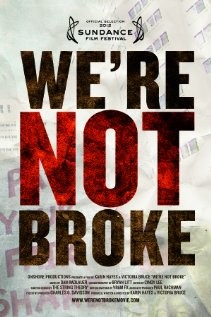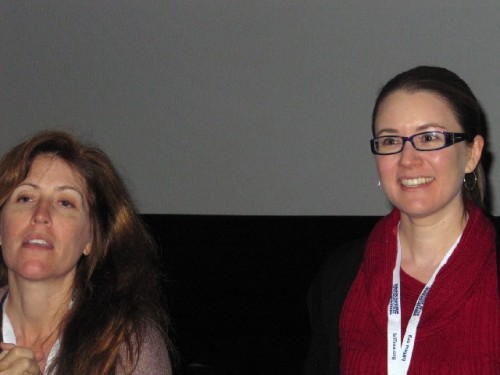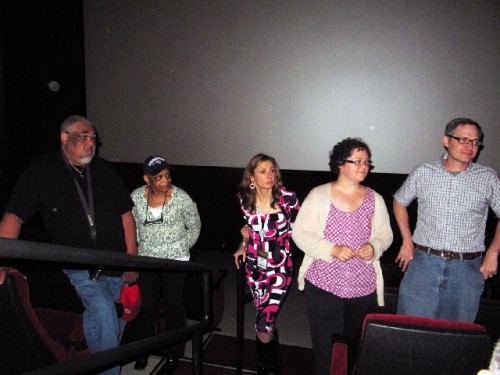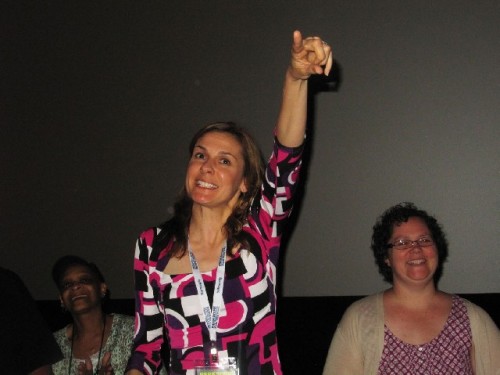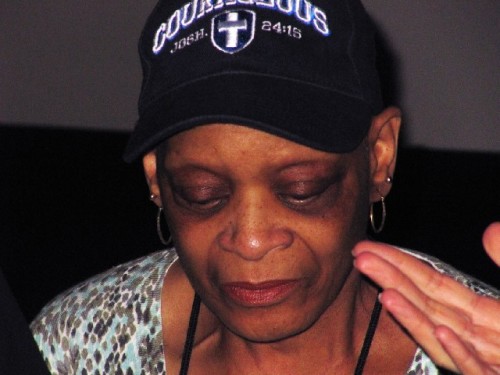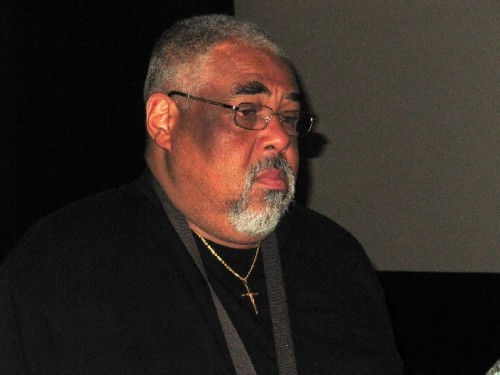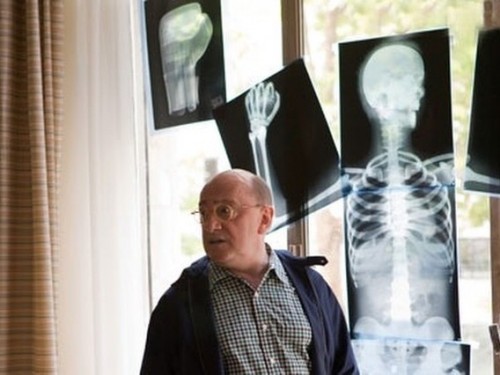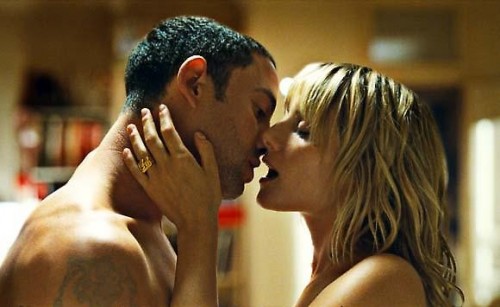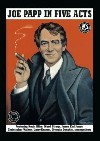BIFF in Pittsfield
A Rainy Saturday at the Movies
By: Charles Giuliano - Jun 03, 2012
After attending opening night in Great Barrington Ethel during the seventh annual Berkshire International Film Festival (BIFF) we opted to focus on screenings in Pittsfield.
Because BIFF has developed into such an abundance of cinematic richness there are conflicts and conundrums. It is challenging to develop a game plan. Not only is there a choice between the schedule in Great Barrington vs. Pittsfield, but also multiple screenings during any single time slot.
For the most part we have done well in the past few days with a couple more films ending the festival today. Having seen seven films in three days they have ranged from good to remarkable. It speaks well to the taste of artistic director, Kelley Vickery, who has, over the past few years, enhanced the value of the festival and its ability to secure the best films, stars, and creators for insightful post screening discussions.
Friday
Liberal Arts
Director/screenwriter: Josh Radnor
Cast: Josh Radnor, Elizabeth Olsen, Richard Jenkins, Allison Janney, Zac Efron, John Magaro, Elizabeth Reaser, Kate Burton
Producers: Jesse Hara, Josh Radnor, Claude Dal Farra, Brice Dal Farra, Lauren Munsch
Executive producer: Paul Prokop
Director of photography: Seamus Tierney
Production designer: Jade Healy
Music: Ben Toth
Editor: Michael R. Miller
95 minutes
Friday presented a tough choice. There were daytime screenings in Great Barrington but not in Pittsfield. For the evening there was an option between another long drive to Great Barrington for a film about the performance artist Marina Abramovic: The Artist is Present (with the artist available for post screening discussion) or a recent Sundance Festival hit, the romantic comedy, Liberal Arts, featured in Pittsfield.
Here it gets personal. Unlike our friend, arts maven Jonathan Schwarz, who checked into a Great Barrington hotel and hunkered down for the duration, we opted to work on Friday and attend the evening event in Pittsfield.
It was attractive to consider the Abramovic screening. Tt was surely unique and well touted (a phoner from Brazil in the Berkshire Eagle) but frankly, this is just me, I’m not a huge fan of the performance artist. I had found her retrospective at MoMA of historic interest (she had groups of actors/ artists recreate a number of her live pieces) but somewhat enervating. In an atrium we spent quality time gazing at the artist staring down visitors who lined up to take turns sitting facing her. The performance piece was the primary focus of the film. Having experienced it in real time there was no compulsion to repeat it in reel time. Her works involve duration and endurance, for the audience, as well as the artist. Of which there is a limit to how much one may take.
We will, however, have more such opportunities. The artist is in the midst of funding to convert a former theatre in Hudson, New York into a museum for performance art.
That said, we made the wrong choice to see the film Liberal Arts, a mildly amusing, romantic comedy written, directed and starring Josh Radnor. It was hardly worthy of its top billing launching the Pittsfield branch of BIFF.
Not that it was bad. Just mediocre.
From a technical point of view, as an Indy film, his second, it was well crafted with a superb cast. We were surprised to see such Williamstown Theatre Festival veterans as our beloved Kate Burton (in a very minor role) and the always crusty, Allison Janney (CJ from West Wing) as a raunchy, tough as nails, former professor of Radnor’s character Jesse Fisher.
The 36-year-old has been lured back to campus for the retirement party of his second-favorite professor played by veteran character actor, the fine Richard Jenkins.
As a man/ boy on the cusp of maturity Jesse is smitten with a girl/woman, sixteen years his junior, the sophomore Zibby (Elizabeth Olsen). Their cloyingly sweet and sentimental elision from platonic to almost sexual was so un-clever and predictable that I wanted to scream.
Liberal Arts is one of those cute little chick flicks that look enticing in trailers but are less appealing to real men. Now and then we make nice and see these flicks with our spouses and girl friends. Often reluctantly admitting that we liked the experience. Suffice it to say that Astrid, and the audience in general, enjoyed the film more than I did.
Saturday
Joe Papp in Five Acts
Writers: Tracie Holder and Karen Thorsen
Director: Tracie Holder
Producers: Tracie Holder, Julia Mintz, Karen Thorsen
On a rainy Saturday morning, it was tough to bolt out of bed, shower, stop at McDonalds for a drive through sandwich, then race to a 9:15 AM screening in Pittsfield.
Actually, there was a technical delay of a half hour. So we got to meet the writers/ directors/ producers prior to their 82 minute documentary about Joe Papp (June 22, 1921 – October 31, 1991), a truly remarkable, innovative, avowed communist, producer.
We were stunned to learn that the film, which will be screened by WNET- PBS which co-produced it, took some twenty years to fund and create. Much of the archival footage was derived from the vaults of Papp’s renowned Public Theatre. It provided vintage glimpses of now legendary performances by then young and emerging artists like George C. Scott as Shylock, Raul Julia and Meryl Streep in Taming of the Shrew, Martin Sheen revealing his Spanish heritage in a riveting clip, the booming James Earle Jones as Macbeth, and so many others.
Papp was a pioneer of blind casting and diversity on stage reflecting that in the audience. It was significant to him that the audience heard Shakespeare in their own vernacular. The intent was to make the poetry of classical theatre broadly accessible.
A child of dirt poor immigrant Jews it took Papp decades to reveal his heritage. He claimed to have a British mother. In fact she only spoke Yiddish. It was only when rabbis objected to plans for Scott to star in Merchant of Venice that he declared “When you prick me do I not bleed?”
His Marxist, agit-prop agenda was to mount Shakespeare on a portable stage which, with a truck borrowed from the city of New York, he brought into tough black and Hispanic neighborhoods. He defined the notion of street theater. With zero marketing and publicity neighborhood audiences flocked to his shows; with many hearing Shakespeare or experiencing theatre for the first time. Some of those neighborhood kids later performed on his stage.
Eventually, he secured a run down outdoor stage in Central Park. Although rained out in the first act one of his initial productions earned a rave review in the New York Times.
As he says on camera even twenty five cents would be too much to charge for Shakespeare in the Park. That tradition continues. But it caused a head on collision with the all powerful city official Robert Moses. It was just the kind of David and Goliath conflict that the feisty, brawling Papp thrived on. Moses insisted on selling tickets but Papp wouldn’t budge. Papp won.
In a run down, former shelter for Jewish immigrants Papp founded the Public Theatre. His mandate expanded from Shakespeare to embracing young and unknown playwrights. Almost reluctantly some of these shows- Galt MacDermot’s Hair and Michael Bennett’s A Chorus Line- moved to Broadway where they defined musical theatre of their era.
While Papp had the stamina and chutzpah to battle giants he also leveled those resources on family, associates, and friends. When he fired his co-producer Bernard Gersten (current artistic director of Lincoln Center and father of WTF director Jenny Gersten) it was described by those in the inner circle as like “cutting off his right arm.”
At the end of his remarkable career, stricken with terminal prostate cancer and faced with the imminent death of his son early in the AIDS epidemic, he may well has spouted the lines from Richard III, “A horse, a horse, my kingdom for a horse.” Facing death we learn that there was a final curtain reconciliation and gathering of “the family.”
This was such a priceless and stunning tribute to such a great figure in American theatre that we were shocked and saddened to learn of its severely limited future.
Because of copyright for archival footage and enormous fees involved Holder and Thorsen stated that it is becoming impossible to assemble such costly documentaries. Government funding for the American Masters series of Public Television, which will show the film, has been cut by some 80%.
The producers sought “fair use” of much of the material including insurance against claims. They learned just last week that WNET will not sign off on it. Accordingly, it will be aired only on American Masters, in a limited run. There will be no theatrical release or edition as DVDs. The film will not be available for schools and libraries. Holder and Thorsen even speculated whether is legal to have shown it at BIFF. The agreement was reached before the recent ruling and we were the grateful beneficiaries.
This raised the issue that surrounds Eyes on the Prize a 14-hour documentary series about the African-American Civil Rights Movement. The series was produced in two stages: Eyes on the Prize: America's Civil Rights Years 1954–1964 consists of the first six episodes covering the time period between the Brown v. Board decision and the Selma to Montgomery marches. It was broadcast in 1987 on PBS. The remaining eight episodes make up Eyes on the Prize II: America at the Racial Crossroads 1965–1985, which was broadcast on PBS in 1990.
It was quickly released to home video (in VHS and Laserdisc). By the mid-1990s, both rebroadcasts and home video production were halted for several years due to limits on the licenses of the copyrights of the archival footage used, and increasingly higher rates imposed by the copyright holders. Grants from the Ford Foundation and others enabled Blackside (the producer) to renew rights. To date, PBS has rebroadcast the first six hours on three consecutive Mondays in October 2006, and rebroadcast the second eight hours in February 2008.
PBS reissued an educational version of the series in the fall of 2006, making it available on DVD for the first time. It is now available to educational institutions and libraries from PBS on seven DVDs (ISBN 0-7936-9262-8) or seven VHS tapes. A consumer version of part one (1954–1965) was released in March 2010. It is unclear whether any footage has been changed to appease rights holders.
The licensing issues from 1993 to 2006 generated what was called Eyes on the Screen, an effort to disseminate the series by file sharing networks without regard to copyright restrictions.
As Holder and Thorsen indicated, as is the case with their own documentary, in the future such projects will become increasingly limited and potentially obsolete. Sadly they observed that our cultural heritage has become an ever more costly commercial commodity.
It is revolting to learn that such an important work as this remarkable portrait of Joe Papp will not be available to future generations of students and theatre professionals. Yet again greed rules and the people, whom Papp devoted his life to with free public theatre, loose.
We’re Not Broke
Directors: Karin Hayes and Victoria Bruce
Producers: Charles G. Davidson, Karin Hayes, Victoria Bruce and Paul Rachman.
The theme of this 81 minute, future HBO documentary, the fifth for the filmmakers, is that while working stiffs like you and me pay taxes, through an elaborate shell game of off shore accounts, major corporations do not.
During the business friendly, Republican dominated era of George W. Bush, tax cuts put some nickels and dimes into the pockets of average Americans, while driving up the national debt by trillions. The Bush initiatives have deprived the nation of staggering billions in uncollected taxes from sheltered corporations and our wealthiest citizens.
Corporations are taxed at the rate of 35% of profits earned in the U.S. but none on profits earned abroad. Taxes are imposed only when those assets return home. There have been a couple of “amnesties” charged at just 5%. This revenue was applied to executive bonuses and share holder dividends which, ironically, a staggering number of employees were laid off. Instead of reevaluating these failed initiatives there is a movement to repeat them.
President Barack Obama vowed to make changes and hasn’t. It is seemingly impossible to effect reforms through a Congress bought and influenced by big business and its enormous army of lobbyists.
As President Herbert Hoover, himself a former businessman, said on the eve of the Great Depression “The business of America is business.”
From the Great Communicator, Ronald Reagan, on the mantra has been to get government off the backs of business and to reduce ‘the tax burden on the average American.’ The deregulation of Wall Street (controls initiated following the Great Depression) which started with Bush and finished by Clinton resulted in the melt down that has cost us trillions in bail outs. With no strings attached. Thanks to Obama, under advice from Timothy Franz Geithner, a former Wall Street insider and currently United States Secretary of the Treasury there are no stipulations or limitations for this “free money.” The financiers failed tomend their ways and even awarded themselves record bonuses paid with our money. Despite broken campaign promises Obama is playing along with the Wall Street scam.
But, whatever one might think of an inept and weak Obama, its “Katie bar the door” against the wacko Tea Party and the risk of business as usual, we all know what that means, with a potential President Mitt Romney.
It is doubtful whether the young activists of the Occupy Wall Street, children’s crusade understand the bait and switch economic policies that got us into this mess. Perhaps they might spend less time camping out and getting beaten up and focus more on actually reading the Wall Street Journal. It is always productive to know the enemy the better to combat it.
The Tea Party truly belives, like the immortal Reagan, that we can pay less taxes, starting with corporations and the mega rich, and still enjoy public education, social services and maintain infrastructure. Remember the “trickle down” theory?
What happened to President Kennedy’s inaugural challenge of "Ask not what your country can do for you - ask what you can do for your country?”
The informative documentary spells out just how corporate America shuffles its assets to avoid paying taxes. It is all perfectly legal however surreal, lethal and pernicious. Conservative/ fundamentalist, yahoos, and the snouts in the trough politicians they put in office, fully intend to keep it that way.
At what point do we cease to be a great nation and function like a banana republic?
Shorts
Mondays at Racine
Director Cynthia Wade
Cast: Cambria Russell, Linda Hart, Rachel Delmolfetto, Cynthia Sansone, Racine Salon de Beaute & Spa
Producers: Vanessa Bergonzoli, Robin Honan and Cynthis Wade
40 minutes
Saving Face
Directors: Daniel Junge, Sharmeen Obaid-Chinoy
Producers: Davis Coombe, Asad Faruqi, Allison L. Greenberg, Daniel Junge, Tanya Mirza, Sharmeen Obaid-Chinoy, Sabiha Sumar, Shahbaz Sumar
40 minutes
This double header of forty minute documentaries proved to be heart wrenching.
They focused on the suffering inflicted on women and their families through cancer in Mondays at Racine and in Saving Face in acid attacks on women by their husbands and in-laws in Pakistan.
This is the third Biff appearance by Berkshire based, Academy Award winning director Cynthia Wade. Several of he individuals who participated in the film were on hand for the discussion. It evoked emotional bonding with an attentive and compassionate audience.
The film focuses on the experience of women fighting cancer and undergoing chemotherapy with its resultant hair loss. Once a month the sisters who own a salon, Racine’s, lovingly offer free cosmetology. Through their services they help the women to feel better about themselves.
We are privy to the struggles of Walter, the husband of Linda, now in her 18th years of fighting cancer. The film reveals his loss of faith and demise that resulted in being asked to leave the home and marriage. It was stunning to see Walter and Linda, together after a year of separation, continuing the struggle. As he told us “What we have gone though as a family I wouldn’t wish on my worst enemy.”
Through the film and discussion it was a struggle to fight back tears.
But there was no way to defend oneself from the horror of devastating images in Saving Face. It is one thing to read about and another to look at the horrible mutilation of women, their faces melted by acid and burned away, at the hands of monstrous husbands.
In our culture it is unfathomable that such violence to women in Pakistan is so common and seemingly ignored with impunity. In probing on camera interviews the husbands show no remorse and deny that they have done these deeds. It conveys the primitive, medieval Biblical/ Koran notion of a wife as chattel or the property of a man. Her status is no more elevated than a beast of burden.
The film follows the actions on a successful Pakistani plastic surgeon doing pro bono work to help the mutilated women. We meet a legal team fighting for justice and seeking strict laws against acid attackers. Traditionally, the offenders get off with a slap on the wrist.
We celebrate with the brave woman who fought her husband in court. Under a brand new law her husband received a double life sentence. Hopefully, fear of such consequences will deter this common abuse.
It was tough to sit through these films. But nothing compared to the misery inflicted on innocent women. We thank BIFF for bringing such powerful films to our attention.
The Day I Saw Your Heart
Director/ writer Jennifer Devoldère
Producer Denis Penot Farid Lahouassa, Aïssa Djabri
Cast Mélanie Laurent, Michel Blanc, Géraldine Nakache, Florence Loiret-Caille, Claude Perron, Guillaume Gouix, Sébastien Castro, Manu Payet, Jean-Yves Roan, Romain Levy, Alexandre Steiger, Daniel Cohen, Luce Mouchel
Music Nathan Johnson and Sound Jérôme Wiciak
After the devastating experience of the pairing of documentary films we were able to end the day with a delightfully charming, clever and thoroughly entertaining French comedy The Day I Saw Your Heart (Et soudain tout le monde me manque) by Jennifer Devoldère.
A bald, whimsical, middle aged man Eli Dhrey shocks his two adult daughters with news that his third wife is pregnant. Dom, trying to adopt, is indignant. Justine, her half sister, responds by making stunning X-ray art from images acquired during her day job. Michel Blanc (The Girl on the Train, 2009 Festival) plays the former jazz musician and businessman Eli. Mélanie Laurent (The Roundup, The Concert, Inglourious Basterds) is delightful and charming as Justine.
Within the context of BIFF, yet again, we were provided with a sample of the enormous difference between a lighthearted romantic comedy like Liberal Arts rather plodding and awkward at best, and a deliciously light and fluffy soufflé like Et soudain tout le monde me manqué.
It’s like comparing coffee and a croissant at Au Bon Pain and enjoying café au lait and pastry at an outdoor café along the Avenue des Champs-Élysées.
There is that Je ne sais quoi quality to a wonderful French comedy. There is the too obvious contrast between Elizabeth Olsen trying so hard to be cute, innocent, virginal and wise beyond her tender years- nice try- and, be still dear heart, our love at first sight encounter with the superbly gifted comedienne Mélanie Laurent, who, my goodness, can actually act.
Laurent in a terrific performance Laurent shows us an incredible range of emotion in contrast to Olsen running the gamut from A to B.
The French film is intricately written, surprising and seemingly effortless.
We are utterly fascinated by the eccentric, middle aged dad with his pregnant much younger wife. His quirky, zany plot twist is a pattern of seeking out and befriending, as buddies and golf partners, Justine’s many cast off lovers.
While she has commitment issues Dad enjoys her taste in men.
That’s utterly crazy if you think about it. But under the facile direction of Devoldère
it is remarkably believable.
As is Justine’s out of control habit of making improbable unauthorized x rays. Justine turns her job into a hobby and eventually an art form. We are delighted as she gets more and more obsessed with x raying everything from boyfriends, to dogs, and refrigerators.
During one such diversion she photographs her dad. In so doing she looks at his heart, the title of the film. He has damage requiring a cardiologist.
A potential therapy entails implanting elements of a pig’s heart. We discover that he is a lapsed Jew as he desperately looks for his yarmulke. In a pinch a baseball cap suffices. In a wonderfully comic scene he and one of Justine’s ex boyfriends seek the opinion of a rabbi. Is it kosher to have a pig’s heart? In a bit of Talmudic finesse it seems ok in order to sustain life which trumps a taboo on the cloven hoof.
At the end of this delightful Gallic romp we find ourselves laughing and crying.
If you get the chance don’t miss this terrific film. Put it in your Netflix queue.
It was a great way to end a rainy, emotionally roller coaster, day at the movies.

